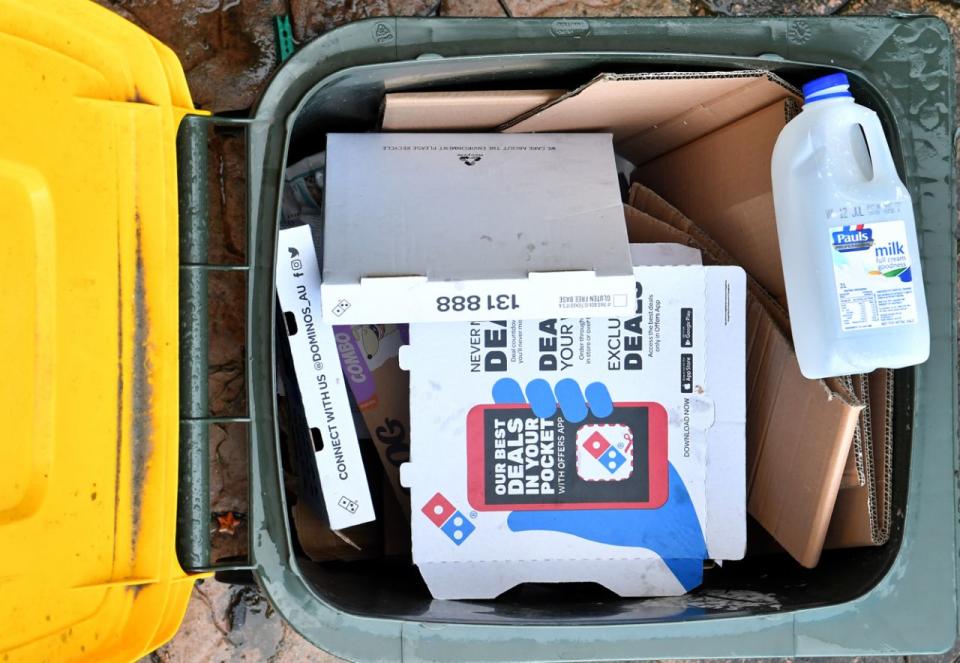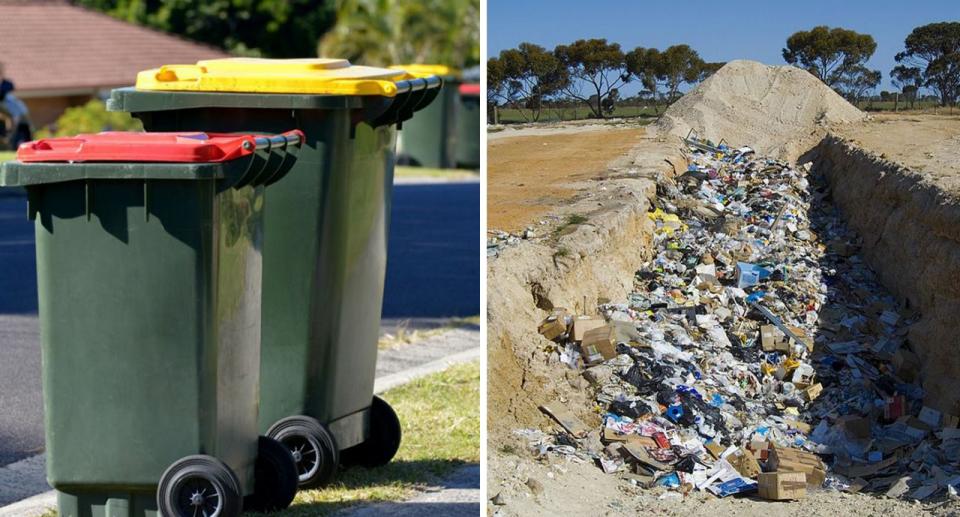Why Aussies should be concerned about the country's recycling crisis
SKM Recycling’s recent collapse has resulted in the country’s recycling industry plunging into a worsening waste crisis, with tonnes of recycling being sent straight to landfill.
In Victoria alone, there are at least half a dozen large warehouses holding tonnes of recycling from homes and commercial businesses.
And now those warehouse owners are in the dark about what’s going to happen to that waste.
So what exactly does the collapse of SKM mean for you and what will happen to our recycling now?
What is SKM Recycling?
SKM was responsible for processing recycling from households and commercial businesses collected from the kerbside in about 30 council areas in Victoria.
Deakin University lecturer in hazards material management, Dr Trevor Thornton, told Yahoo News Australia SKM was also serving about half a dozen council areas in Adelaide.
SKM started storing recycling in a number of warehouses in Victoria, with recycling from Adelaide brought over the border to the Victorian warehouses as well.

The company was ordered to stop taking recycling after a number of fires at its Melbourne facility.
While SKM's collapse was predicted, it was largely triggered by China's decision to stop accepting overseas waste, sending Australia's recycling industry into chaos.
The company's problems have forced dozens of councils to send recycling straight to landfill – and they still have to pay a "landfill tax" for every load that goes to the tip.
Why is recycling being stockpiled in warehouses?
This week SKM went into receivership with $100 million worth of debts and according to Dr Thornton, the loss was caused by a number of different factors.
He said it was only a viable business if processed recycling could be sold for a reasonable price.
“Anybody could and should buy it but not a lot of people have been, especially in Australia,” he told Yahoo News.
“Paper and cardboard can be bought by packaging companies and plastic can be used to create a whole variety of packaging components. Glass can be made into road base.
“But Australian businesses haven’t been buying a lot of the product due to the heavy level of contamination. When they buy contaminated recycling they have to clean it up and the quality of their product is then compromised.”

Dr Thornton said SKM essentially told councils it would receive recycling and process it for virtually nothing. But they were doing it with the plan to make a profit by selling recyclables in the marketplace.
“When they couldn’t sell it overseas their whole business model about getting that return failed, they were either selling it for a cheaper price or not at all so weren’t really getting an income,” Dr Thornton said.
“SKM has been relying on stockpiling, waiting for the markets to improve but it’s getting too much.”
Dr Thornton said it was up in the air what would happen to the these stockpiles and the government and owners of the warehouses would have to make a decision to either send it all to landfill, or hold onto it to see if they could clean it up and sell it – but he believes that is an unlikely option.
Households still making recycling mistakes
Contaminated recycling is leading to major problems as companies do not want to provide the resources to repurpose it.
Dr Thornton said Aussie households were still making a number of mistakes when recycling their rubbish, whether that be putting plastic bags, nappies or garden waste into the wrong bin.

“If a plastic bag is mixed in with the recycling, what happens when it gets to the sorting facility, things such as paper might go into a machine that blows it into a stream to be bailed.
“The plastic bags act like paper so they go into that and contaminate the paper stream.”
He said while broken glass was allowed to be put in the recycling bin, it could also act as a contaminant if little shards got stuck in cardboard material.
“About 10 per cent of recycling contaminants however are things that can’t be recycled,” Dr Thornton said.
How can the recycling crisis be solved?
Dr Thornton said there was no easy solution but updated machinery and infrastructure to process recycling would be a step in the right direction.
“We need to get facilities built and different systems in place but that all takes time,” he said.
“We should be doing things like educating the community and businesses about recycling to reduce the levels of contamination.
“We should be concerned about this and need to put the foot down.”
Waste management company Cleanaway has been touted as the replacement for SKM in Victoria.
Cleanaway announced on Wednesday it had acquired $60 million of SKM’s debts.

"The acquisition of the debt will allow us to work with the receivers to examine viable options for SKM," Cleanaway chief executive Vik Bansal said in a statement.
"If a sale process is undertaken and if we are successful in purchasing any assets, we will return the assets to a sustainable footing."
Dr Thornton said if Cleanaway took over it would need to inject money into updating processing machinery.
Will the stockpiles just go to landfill?
Dr Thornton said the environmental impacts of sending recycling to landfill was not a huge issue as tips were nowadays designed to minimise environmental impacts.
While paper and cardboard would cause some methane emissions, Dr Thornton said that wasn’t the main concern.
Sending recycling to landfill was mostly an issue because it would be a loss of resources, and lead to more plastics being used to make products.
“In a circular economy, you don’t want to lose resources but instead keep using them,” he said.
“While recycling is good, we should be focusing on not generating waste in the first place and it’s about the consumer making the right choices.
“Let’s reduce the packaging and composite packaging made from different materials that can’t be recycled.”
– With AAP
Do you have a story tip? Email: newsroomau@yahoonews.com.
You can also follow us on Facebook, download the Yahoo News app from iTunes or Google Play and stay up to date with the latest news with Yahoo’s daily newsletter. Sign up here.



